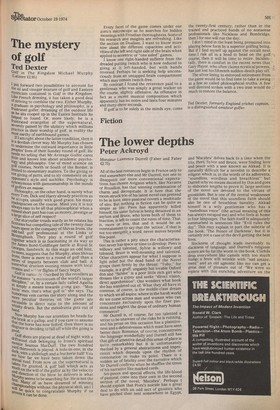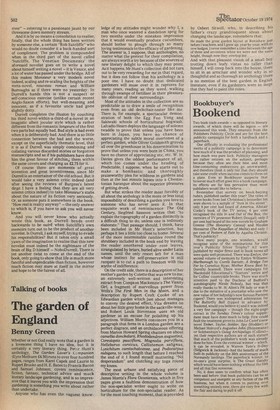Fiction
The lower depths
Peter Ackroyd
Monsieur Lawrence Dun-ell (Faber and Faber £2.75)
All of the best romances begin in France only to end somewhere else and Mr Durrell, not one to disappoint our more conventional expectations, has chosen Avignon which, like Navarre or Rousillon, has that winning combination of charm and decrepitude. It is here that the moon-struck trio of his latest novel can pretend to be in love, since pastoral covers a multitude of sins. But nothing in fiction can be quite as simple as tile: Piers has apparently killed himself, his sister Sylvie is being detained in an asylum and Bruce, who loves both of them to inaction, is left to count the ruins of time. That is, more or less, that and it would be an overstatement to say that the 'action', if that is not too energetic a word, never moves beyond this point. This is rather a pity since the characterisation never has space or time to develop: Piers is willowy and talented, Sylvie is willowy and talented, Bruce is well-meaning and talented. Other characters appear for what I suppose is light relief but the dead hand of the Novel grasps them firmly by the throat: "Toby," for example, is a gruff, ungainly but lovable Oxford don and "Sabine" is a poor little rich girl who dresses like a gypsy and seeks "direct vision, direct apprehension". One wonders what book she has wandered out of. What they all have in common, of course, is the middle-class dream to which we all aspire: where in the harsh world do we come across men and women who can concentrate exclusively upon the finer passions and neglect the dross of ordinary human commerce? Mr Durrell is, of course, far too talented a writer to be unaware of the risks he is running, and his prose on this occasion has a plaintiveness and a defensiveness which must have seen better days. Romance, of course, concentrates the language wonderfully and Durrell still has that gift of attentive detail (his sense of place is quite remarkable) but it is unfortunately masked by a general abstractness and imprecision which depends upon the rhythm of connotation to make its point. There is a sodden air of fatality over the narrative which Mr Durrell confirms when he shuffles the times of his narrative like marked cards. Set-pieces and special effects, the life-blood of pastoral, come into their own in the second section of the novel, `Macabru'. Perhaps I should explain that Piers's suicide has a great deal to do with an odd sect of gnostics who have pitched their tent somewhere in Egypt,
and 'Macabru' delves back to a time when the trio, Piers, Sylvie and Bruce, were finding love and peace with a seer known as Akkad. It is naturally difficult for a novelist to describe a religion which is, in the words of its adherents, "soundless, wordless and breathless" but Dun-ell is by no means daunted by this and goes to elaborate lengths to prove it; large sections of the novel are devoted to the virtues of gnosticism. But is one of the central weaknesses of the novel that this soundless faith should also be one of breathless banality. Akkad himself is a wily gentleman who has a "melodious voice" (the actual meaning of this has always escaped me) and who feels at home in four languages. The faith itself is adequately summarised in sentences like "Evil rules the day". This may explain in part the subtitle of the book, 'The Prince of Darkness', but it is certainly not a case of the devil getting the best lines.
Slackness of thought leads inevitably to slackness of language, and Durrell's religiose scenes are by far the worst in the book. Cliches drop everywhere like camels with too much hump: a brow will wrinkle with "sad amazement" and an old agnostic like me can get a great deal of pleasure out of "We were so replete with this enriching adventure on the river" — referring to a passionate jaunt by our threesome down memory stream.
And it is by no means a consolation to realise, finally, that the whole thing has been written by someone else, a certain "Rob Sutcliffe" who would no doubt consider it a back-handed sort of compliment. The problem is compounded when in the third part of the novel called 'Sutcliffe, The Venetian Documents' the aforesaid novelist goes on to write a novel about himself writing a novel — it is Venice, and a lot of water has passed under the bridge. All of this makes Monsieur a very modern novel indeed, scaling and re-scaling the heights of the• meta-novel, nouveau roman and William Burroughs as if there were no yesterday. In Durrell's hands this is not a suspect or self-conscious exercise (unlike certain recent Anglo-Saxon efforts), but well-meaning and innocent, as if a favourite uncle had gone slightly dotty.
Durrell completes the illusion by couching his third novel-within-a-third-of-a-novel in an -imagistic albeit jocular style which is rather different from the romantic longeurs of the first two parts but equally bad. Bad style is bad even when it is deliberately bad. And there is so little connection between the bad and the worse, except on the superficially thematic level, that it is as if Durrell was simply combining and collating various discarded stories or forgotten manuscripts and as if his publishers have done him the great favour of stitchin them within the same covers and charging us £2.75 for it.
Of course there are moments of great invention and great inventiveness, since Mr Durrell is an entertainer of the old school. But it would take a very solemn critic indeed (and after seeing the reviews of Burgess's latest dirge I have a feeling that they are all very solemn critics indeed) to take Monsieur's stabs about the nature of its fiction very seriously. Or, as someone puts it somewhere in the book, "How real is reality anyway" — the only answer to which is, if you have to ask you will never know.
And you will never know who actually wrote this book, as Durrell bends over backwards to be outrg when Sutcliffe's own memoirs turn out to be the product of another novelist. Is Durrell, I ask myself, trying to evade his responsibilities? But it takes only a small yawn of the imagination to realise that this new novelist must indeed be the nightmare of the brain of Big D himself — NoboDurrell. There is yet another twist to come at the end of the book, only going to show that life is much more fanciful and unpredicable than fiction, however much fiction may stare at itself in the mirror and hope to be the fairest of all.



































 Previous page
Previous page